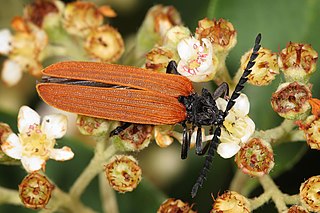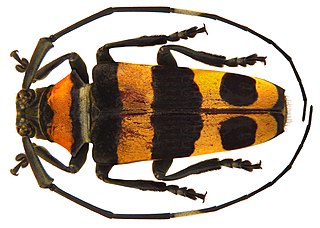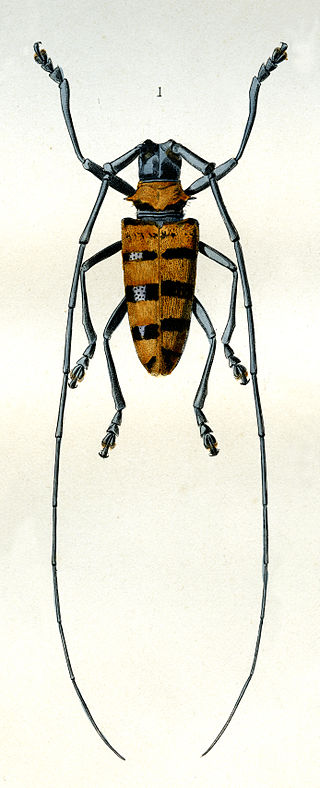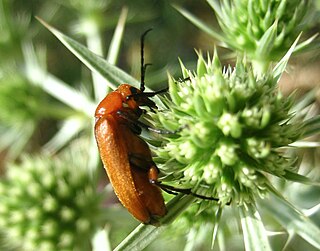
Waterhouses is a village in Brandon and Byshottles civil parish, in County Durham, England. It is situated to the west of Durham, near Esh Winning, on the northern Bank of the River Deerness.

The Prioninae are a subfamily of Cerambycidae. They are typically large (25–70 mm) and usually brown or black. The males of a few genera sport large mandibles that are used in fights with other males, similar to stag beetles. These beetles are commonly nocturnal and are attracted to light. The majority of the Prioninae whose biology is known are borers whose larvae feed on rotting wood or roots.

Zopheridae is a family of beetles belonging to Tenebrionoidea. It has grown considerably in recent years as the members of two other families have been included within its circumscription; these former families are the Monommatidae and the Colydiidae, which are now both included in the Zopheridae as subfamilies or even as tribe of subfamily Zopherinae. Some authors accept up to six subfamilies here, while others merge all except the Colydiinae into the Zopherinae.

The Lycidae are a family in the beetle order Coleoptera, members of which are commonly called net-winged beetles. These beetles are cosmopolitan, being found in Nearctic, Palearctic, Neotropical, Afrotropical, Oriental, and Australian ecoregions.

Cerambycinae is a subfamily of the longhorn beetle family (Cerambycidae). The subfamily has a world-wide distribution including: Asia, Europe and the Americas. Within the family, the only subfamily of comparable diversity is the Lamiinae.

Hesperilla is a genus of skipper butterflies in the family Hesperiidae, found throughout most of Australia.

Trapezites is a genus of skipper butterflies in the family Hesperiidae. All species are endemic to Australia.

Batocera is a genus of the family Cerambycidae, subfamily Lamiinae, close to the genus Rosenbergia.

Dorcasominae is a subfamily in the longhorn beetle family Cerambycidae. There are about 14 genera and more than 30 described species in Dorcasominae, found mainly in Asia and Africa. These genera are sometimes considered members of the tribe Dorcasomini, which would be the only tribe of this subfamily. This classification is in accordance with the TITAN Cerambycidae database, Catalogue of Life, and Photographic Catalog of the Cerambycidae of the Old World. It is similar to that of Bouchard et al. in "Family-group names in Coleoptera", 2011.
Stenoderini is a tribe of beetles in the subfamily Cerambycinae, containing the following genera and species:

Dorysthenes is a genus of longhorn beetles of the subfamily Prioninae.

Syllitus is a genus of long-horned beetles in the family Cerambycidae. There are more than 40 described species in Syllitus.
Eccrisis is a genus in the longhorn beetle family Cerambycidae. There are about 19 described species in Eccrisis, found in Madagascar.

Apomecynini is a tribe of longhorn beetles of the subfamily Lamiinae.

Desmiphorini is a tribe of longhorn beetles of the subfamily Lamiinae.

Cereopsius is a genus of longhorn beetles of the subfamily Lamiinae, containing the following species:

Nemophas is a genus of longhorn beetles of the subfamily Lamiinae, containing the following species:

Zonitis is a genus of blister beetles in the family Meloidae. The genus was named and described by Johan Christian Fabricius in 1775.

Prostomis is a genus of beetles in the family Prostomidae.


















